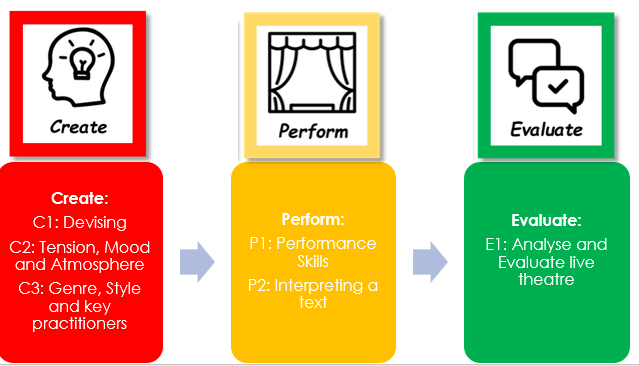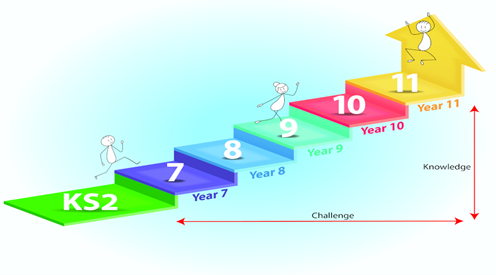Drama
Moving from Primary to Secondary
Pupils may join Acorn secondary schools with a variety of experience in drama ranging from weekly drama lessons to school productions. Regardless of experience, we begin KS3 with baseline tests for all pupils in year 7. These consist of 3 tasks that assess their current attainment in creating, performing and evaluating drama. This then gives our teachers a better idea of how confident pupils are and their previous knowledge of drama.
Pupils are encouraged to adopt, create and sustain a range of roles throughout their first year in Drama and to be as creative as possible in their drama lessons.
Creating Subject Experts
Helping our learners become great Performers.
Our vision:
- Joyful and inclusive learning for all.
- Encourage progress in performance skills that help to develop transferable skills.
- Promote an interest in theatre through extra-curricular clubs, school productions and trips.
We aim to help students build a ‘Drama Toolkit’ through the key stages:
- Year 7 are taught performance skills, how to interpret a text and theatrical conventions, such as tension and atmosphere becoming confident in these threads.
- Year 8 introduces students to devising, genre and styles of drama, whilst revisiting performance skills and interpreting texts and becoming competent in these threads.
- Year 9 promotes investigation into key practitioners and social historical and cultural contexts of performance texts whilst revisiting performance skills to feel assured and competent in the threads of genre and style.
Create, Perform and Evaluate are our key disciplines throughout the curriculum covered in each scheme of learning and interleaved through each individual year, as well as from Year 7 through to Year 11. Substantive knowledge is taught through the key disciplines of theatre practitioners, forms, genre and styles of Drama. Disciplinary knowledge is taught through our key disciplines of performance skills, devising, analysis and evaluation.
Throughout KS3, students can build to becoming an expert in drama and develop their own creative intentions as a theatre practitioner ready to create, perform and evaluate successfully in KS4 and 5.
Subject Disciplines (Skills)
We have three key disciplines in drama: create, perform and evaluate. These are the disciplines that pupils need to become experts in, in order to become an outstanding theatre practitioner.

Subject Substantives (Knowledge)
We split our disciplines down even further into the following golden threads:

Roadmap
Image to follow
How we assess your child
Assessment Grades KS3
Students complete assessments in each of their subjects at key points during the year which test their understanding of all the knowledge they have learnt to date (we call these cumulative assessments). We grade these assessments on a scale from 1-9 (9 being the highest). The assessments are designed so that each year they become more challenging and test students on their growing bank of knowledge.
Therefore, as an example, if your child achieves a grade 5 in an assessment in Year 7, we can predict confidently that they should go on and achieve at least a grade 5 at GCSE. This is providing they keep working hard and progressing. Please note: this prediction states “at least”. Students often achieve higher than this.
In years 7 – 9, in practical subjects (PE, Drama, Music etc.), we assess students on their practical ability and skills. This gives us a strong indication of how successful they would be if they chose one of these subjects as a GCSE option. However, in order to get a fuller view of their potential success, it is also important to consider their grades in the core subjects. This is because there is often a literacy, numeracy, or scientific element to the courses.

Assessment Grades in KS4
Students complete mock exams in each of their subjects at key points during the year which test their understanding of all the knowledge they have learnt to date. We grade these mock exams on a scale from 1-9 (9 being the highest). In the report you will see:-
- Target Grade: This is based on a student’s past performance. It is an aspirational but achievable target
- Mock Grade: The grade they achieved in the mock exam
- Predicted Grade: The grade a teacher believes a student will achieve in the final exam, if they maintain their current ATL and performance
Assessment Grades in KS5
Students complete mock exams in each of their subjects at key points during the year which test their understanding of all the knowledge they have learnt to date. We grade these mock exams on a scale from A*-E/Distinction* - Pass. In the report you will see:-
- Target Grade: This is based on a student’s past performance. It is an aspirational but achievable target
- Mock Grade: The grade they achieved in the mock exam
- Predicted Grade: The grade a teacher believes a student will achieve in the final exam, if they maintain their current ATL and performance
Exam Board Information
|
OCR GCSE Drama
|
||||||||||||||||||||



